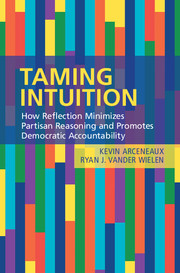Book contents
- Frontmatter
- Contents
- List of Figures
- List of Tables
- Preface and Acknowledgments
- 1 Democratic Accountability and the “Rational” Citizen
- 2 A Theory of Individual Differences in Reflection and the Intuitionist Model of Political Reasoning
- 3 Measuring Individual Differences in Reflection
- 4 Toeing the Line: Partisan Identities and Policy Attitudes
- 5 Throwing the Rascals Out: Partisan Identities and Political Evaluations
- 6 Can't We Disagree without Being Disagreeable? The Role of Reflection in a Polarized Polity
- 7 Reflections on the Role of Reflection in Democracies
- Appendix Details of Empirical Studies and Statistical Analyses\
- Notes
- References
- Index
6 - Can't We Disagree without Being Disagreeable? The Role of Reflection in a Polarized Polity
Published online by Cambridge University Press: 30 August 2017
- Frontmatter
- Contents
- List of Figures
- List of Tables
- Preface and Acknowledgments
- 1 Democratic Accountability and the “Rational” Citizen
- 2 A Theory of Individual Differences in Reflection and the Intuitionist Model of Political Reasoning
- 3 Measuring Individual Differences in Reflection
- 4 Toeing the Line: Partisan Identities and Policy Attitudes
- 5 Throwing the Rascals Out: Partisan Identities and Political Evaluations
- 6 Can't We Disagree without Being Disagreeable? The Role of Reflection in a Polarized Polity
- 7 Reflections on the Role of Reflection in Democracies
- Appendix Details of Empirical Studies and Statistical Analyses\
- Notes
- References
- Index
Summary
On September 9, 2009, President Obama spoke at a joint session of Congress about his proposal to expand health care insurance. The issue had deeply divided Democrats and Republicans in Congress as well as within the electorate. About midway through the speech, Obama noted that his proposal would not extend coverage to individuals living in the country illegally, despite concerns voiced by Republicans to the contrary. The claim was too much to take for JoeWilson, the Republican representative of South Carolina's second congressional district. From the back of the chamber he shouted, “You lie!” It was an extraordinary breach of decorum. Presidential addresses to Congress are generally only interrupted by applause, rather than name calling. YetWilson's outburst is not an isolated story in today's divisive political climate. Discourse among members of Congress has become less civil (Ahuja, 2008), and members from both parties have increasingly resorted to calling members from the other side names (Annenberg Public Policy Center, 2011). Partisan incivility extends beyond Congress, as well. Partisan talk show hosts on the radio and television routinely minimize those who disagree with them as idiots, pinheads, and just plain stupid (Sobieraj and Berry, 2011). It also reaches down to discourse among citizens. In a study of exchanges in the comment section of newspapers, Coe, Kenski, and Rains (2014) find that over a half include uncivil words.
The rise in partisan incivility tracks with increasing levels of polarization in Congress. Since the 1970s, Democrats and Republicans in the US House of Representatives as well as the US Senate have become steadily more likely to take ideologically divergent positions on issues and vote along party lines (McCarty, Poole, and Rosenthal, 2006). The passage of Medicare in 1965 and the passage of the Affordable Care Act in 2010 illustrate this profound transformation in Congress. Both count as landmark pieces of legislation that expanded health care coverage in the United States. Denounced as “socialized medicine” by opponents, both sparked controversy that divided the electorate (Klein, 2010). Despite the similarities in the prevailing opposition to these programs, half of the Republican caucus supported the passage of Medicare, while not one Republican voted for the Affordable Care Act (Herszenhorn and Pear, 2010; Social Security History, 2014).
- Type
- Chapter
- Information
- Taming IntuitionHow Reflection Minimizes Partisan Reasoning and Promotes Democratic Accountability, pp. 135 - 151Publisher: Cambridge University PressPrint publication year: 2017



